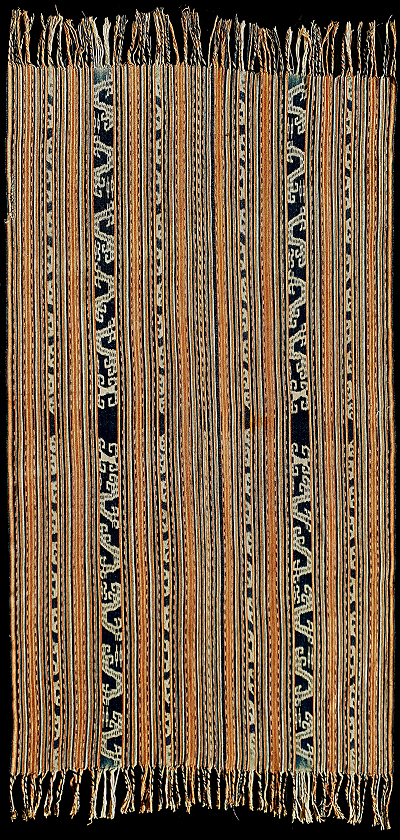| |
 

LEFT THE COLLECTION
display continued to support resarch | | | |
023 Timor, West Timor
Beti naek (men's wrap)  
| | Locale: | Insana or Ambenu | | Period: | 1920-1940 | | Yarn: | Cotton, hand-spun, medium | | Technique: | Warp ikat | | Panels: | 2 | | Size: | 85 x 155 cm (2' 9" x 5' 1") LW: 1.82 | | Weight: | 605 g (21.3 oz), 459 g/m2 (1.50 oz/ft2) | | Design: | Men�s wrap of the type that Yeager & Jacobson (2002:89, 91) classify as �multiple design stripe� It is which is found mostly in the Atoni border areas of Belu: Biboki, Insana, Amanatun, and in the Oecusse (Ambenu) semi-exclave of Timor-Leste. The motifs are not represented in the cited work, but Fiedler identifies them as ducks. They also appear as mirrored pairs, e.g. in PC 157. The design contains two forms of asymmetry, a break with ikat�s technical diktat that Yeager & Jacobson encountered with some frequency in wraps of this type. Usually the two panels are mounted so they mirror each other, here they face the same way. Moreover, the seam does not run in the middle, but 40 cm from one outer selvedge, and 45 from the other. Part of the warp was transposed from one panel to the other to achieve this asymmetry, in dualist Austronesian cosmology an important desideratum, as it brings complementarity, hence wholeness, balance, harmony.� | | Comment: | Only vegetable dyes were used, including the yellow and pastel green pinstripes. The morinda, probably because of admixtures, has a dark ochre shade. The cloth has a warm tonality and is a delight to wear around the shoulders, as it has a certain sturdiness without being heavy. The indigo is deeply saturated, yet tightly controlled: all the outlines are sharp, with no observable dye seepage, a quality that Insana is known for. This aspect supports an attribution to Insana, though the asymmetry makes Oecusse (Ambenu), where it is more sought, another good candidate for attribution. � | | Background: | Chapters on Timor and West Timor. | | Exhibited: | Timor: Totems and Tokens, Museu do Oriente, Lisbon, 2019/20. | | Sources: | Yeager and Jacobson, Textiles of Western Timor, Ch. 5.3.3.3. An Insana beti with a similar motif, but more detailed, is shown in Plate 146. | | |

©Peter ten Hoopen, 2025
All rights reserved.
|
|


